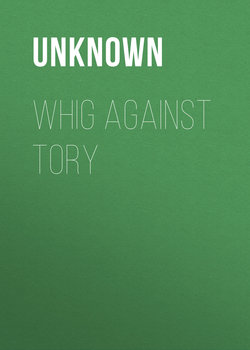Читать книгу Whig Against Tory - Unknown - Страница 1
INTRODUCTION
Оглавление"Will you tell me a story this evening, father?" asked William P., a fine lad of twelve years of age, the son of General P., who had been a gallant officer in the revolutionary war.
"And what story shall I tell you, my son?" said the general.
"Something about the war, father."
"You are always for hearing about the war, William," said General P. "I have told you almost all the stories I recollect. And besides, William, if you love to hear about war so well, when you are young, you will wish to be a soldier, when you become a man."
"And would you not wish to have me a soldier, father, if war should come?—you was once a soldier, and I have heard people say, that you was very brave, and fought like a hero!"
"Well, well, William," said the general, "I must tell you one story more. Where are Henry and John? You may call them—they will like to hear the story too."
(Enter William, Henry and John.)
Henry. "Father! William says you are going to tell us a story about the war! what–"
John. "Shall you tell us about some battle, where you fought?"
Gen. P. "Sit down, my children, sit down. Did I ever tell you about Enoch Crosby?"
William. "Enoch Crosby? why, I never heard of such a man."
Henry. "Nor did I."
Gen. P. "I suppose not; but he was a brave man, and did that for his country, which is worthy to be told."
John. "Was he a general, father?"
Gen. P. "No; he was a spy."
William. "A spy! a spy! father, I thought a spy was an odious character?"
Gen. P. "Well, a real spy is generally so considered. I think it would be more appropriate to say, that he was an informer. During the war, many Americans were employed to obtain information about the enemy. They were often soldiers, and received pay, as did the soldiers, and sometimes obtained information, which was very important, especially about the tories, or such Americans as favoured the British cause."
Henry. "Is that the meaning of the word tory?"
Gen. P. "Yes; tories were Americans, who wished that the British aims might succeed, and the king of England might still be king of the colonies. Those who wished differently, and who fought against the British, were called whigs."
John. "Was Crosby a whig?"
Gen. P. "Yes; no man could be more devoted to the liberty of his country."
William. "Whence were the names whig and tory derived?"
Gen. P. "Do you wish to know the original meaning of the words, my son?"
William. "Yes, sir."
Gen. P. "The word tory, the learned Webster says, was derived from the Irish, in which language it signifies a robber. Tory, in that language, means a bush; and hence tory, a robber, or bushman; because robbers often secrete themselves in the bushes. The meaning of the word whig, I am unable to tell you. Its origin is uncertain. It was applied, as I told you, to those who fought for the liberty of America."
William. "If the word tory means a robber, it was very properly applied to those, who wished to rob the people of America of their rights—don't you think so, father?"
Gen. P. "Exactly so, William—a very just remark."
John. "Father! I thought you was going to tell about Enoch Crosby?—"
Gen. P. "True, master John, we will begin."
